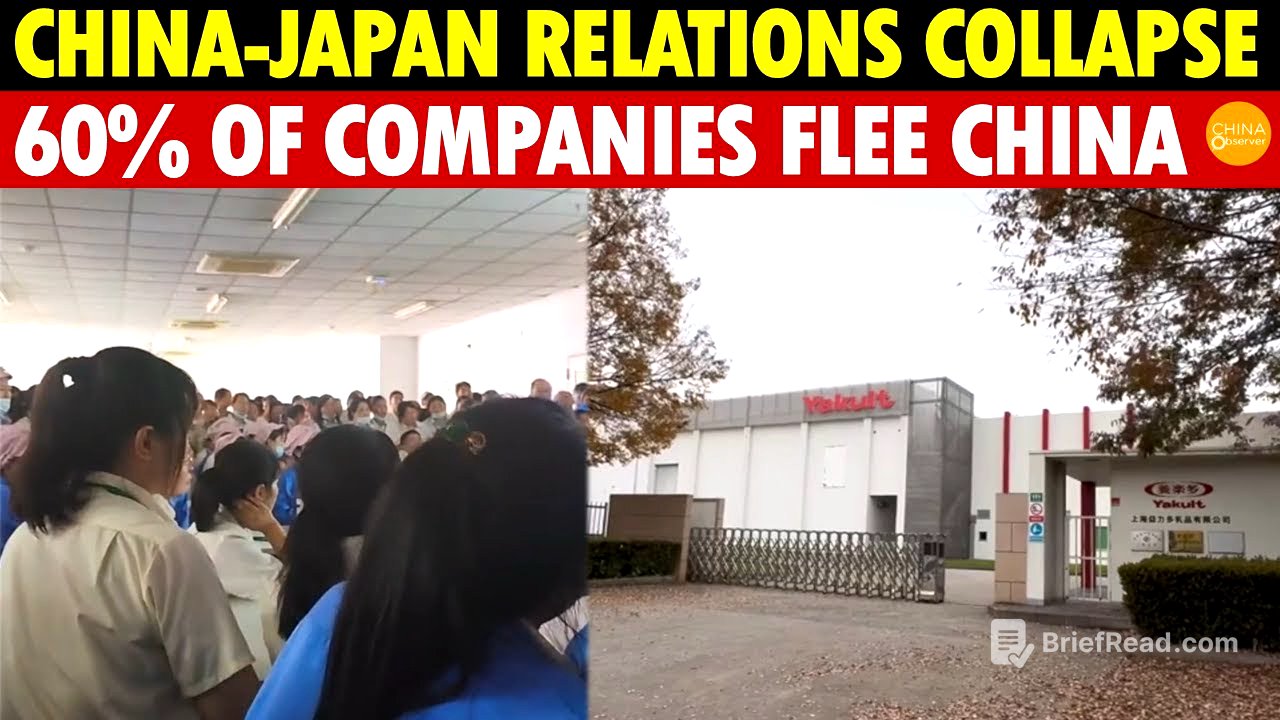TLDR;
The video discusses the increasing trend of Japanese companies withdrawing from China, exemplified by Yakult closing its first factory there. This pullback reflects broader concerns about China's economic conditions, geopolitical tensions, and a preference for investing in the United States. The election of a new Japanese Prime Minister, Sana Takahuchi, is expected to accelerate this trend, aligning Japan more closely with the US in economic and strategic policy, potentially straining relations with China further.
- Japanese companies are increasingly pulling out of China due to economic and geopolitical concerns.
- Yakult is closing its first factory in China as part of a broader restructuring effort.
- Japan's investment in China has significantly decreased, while investment in the US is rising.
- The new Japanese Prime Minister, Sana Takahuchi, is expected to strengthen ties with the US and take a firm stance against China.
- Takahuchi's cabinet includes members with strong views on national security and immigration, signalling a potential shift in Japan's policies.
Yakult Factory Closure and Broader Trend [0:00]
Yakult, the Japanese beverage company, is closing its first factory in Guangjo, China, as part of a business restructuring. This involves transferring production to other facilities. This is Yakult's second factory closure in China within a year, following the shutdown of a Shanghai plant. While Yakult's sales in China grew significantly from 2002 to 2021, they have since declined, prompting these restructuring efforts.
Japanese Companies Retreating from China [1:38]
Yakult's factory closure reflects a wider trend of Japanese investment pulling back from China. Fuji Cuda Limited, for example, closed its Shanghai factory, providing compensation packages to its employees that were praised online. Numerous Japanese companies in the automotive and electronics industries, including Mitsubishi, Toyota, Panasonic, and Sony, have scaled back or exited their operations in China.
Decline in Japanese Investment and Residents [3:31]
Japan's direct investment in China has fallen significantly, with a 60% decrease from its 2017 peak. A survey of Japanese firms in China revealed that a majority believe China's economic conditions have worsened, leading many to plan investment cuts. Concerns for the safety of employees and families have also contributed to this decline. The number of Japanese residents living in China has fallen below 100,000 for the first time in 20 years, with significant population drops in cities like Beijing and Dalian.
Geopolitical Tensions and US Influence [5:26]
Beyond safety concerns, Japanese companies are increasingly uneasy about geopolitical tensions and the US's efforts to restrict China's access to advanced technologies. In contrast, Japanese investments in the United States are rising, making the US the largest destination for new Japanese investment. This shift is influenced by the US's economic scale and a broader global trend of moving investment out of China. US firms are also downsizing in China, further contributing to this exodus.
New Japanese Prime Minister and US Relations [7:01]
Japan's new government, led by Prime Minister Sana Takahuchi, is expected to align even more closely with the US on economic and strategic policy. Takahuchi has pledged to strengthen Japan-US relations and is set to meet with the US President to discuss key issues. This builds on previous agreements where Japan committed to investing significantly in the US in exchange for reduced tariffs.
Takahuchi's Stance on China and Policy Expectations [9:10]
Takahuchi is expected to continue a firm stance against the Chinese Communist Party, aligning with the US's approach. She is likely to cooperate with Washington in curbing China's influence and tighten controls on Chinese students, immigrants, and investments. While some analysts predict strained Japan-China relations, others suggest economic interdependence may temper her actions.
Cabinet Appointments and National Security [12:57]
Takahuchi's cabinet includes members with strong views on national security, such as Kimmy Onoda, the Minister of Economic Security. Onoda has raised concerns about the use of Chinese-made robotic vacuum cleaners in Japan's parliament, highlighting potential data collection risks. She has also pledged stricter enforcement against foreigners who violate regulations, reflecting a focus on national security and immigration control.
Accelerated Withdrawal and Economic Separation [15:41]
Takahuchi's administration is expected to accelerate Japan's corporate withdrawal from China, with more companies likely to relocate under government policies. Japan's decoupling from China is considered nearly complete, with many firms having already abandoned their factories. Japan is now expected to deepen cooperation with Taiwan and the United States, further solidifying this economic separation.









